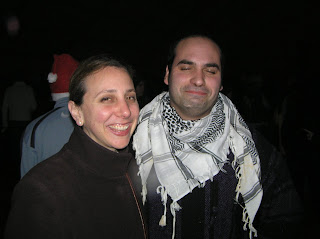
A funny thing happened on a recent trip to Spain with friends. As we wandered around some of the towns and villages, we kept seeing people wearing keffiyahs, the wrap/headscarf traditionally associated with Palestinian nationalism. These were people from all walks of life, from hip young kids to professionals to even kindly looking pensioners.
In the US, people I know who might wear keffiyahs would do so as an overt political statement-- to express solidarity with Palestinians. But as we noticed this overflowing sea of keffiyahs all over the place, something seemed off. Had the whole nation of Spain suddenly discovered its heartfelt loyalty to the Palestinian cause? Or was something else going on?
We decided to ask. Here are some of the responses we got, in rough translation from Spanish.
---------------------------------------------------------
Setting One: A Massive New Years Eve Party in the Town of Gandia, Valencia Province. A huge outdoor tent, with mud floors, loud music, and lots of young people.
 Emma: Out of curiosity, why are you wearing that scarf? In the US, it would be a political statement. Is that why you are wearing it?
Emma: Out of curiosity, why are you wearing that scarf? In the US, it would be a political statement. Is that why you are wearing it?Guy #1: No. Well my mom went to Turkey on holiday and she got one for me. And it's really warm. Cold tonight, isn't it?
Emma: Cool, can we take a photo with you?
Guy #1: Um. Sure.
---------------------

Paula: Hi, mind if I ask you a question? Was wondering about the keffiyah you're wearing. Do you call it a keffiyah?
Guy #2: Oh, this palestino?
Paula: Right. The palestino...I was curious as to why you're wearing it. Palestino- that means its about the Palestinians?
Guy #2: (Shrugs). It's fashion, I think. It's trendy.
Paula: Okay. Interesting. Could we possibly take your picture? (Guy shrugs indicating mild unenthusiastic consent)
------------------------
Setting #2 - Valencia Town
 A bougie couple chooses from many different colored variations of the keffiyah, some even with gold or silver decorative thread.
A bougie couple chooses from many different colored variations of the keffiyah, some even with gold or silver decorative thread.Emma later asked the shopkeeper later whether there was any politics involved at all with this item. He said no, it was just a fashion trend.
-----------------
Setting #3 - Barcelona
Two Australian tourists in a cafe wearing keffiyahs. And lots of gold and pearls. And headbands. Eating delicate pastries. An interesting combination.

Emma: Hi there, out of curiosity, where did you get those scarves?
Taller girl: Oh these, don't remember.
Emma: Is it a political statement about Palestinians?
Taller girl: Oh, no, not at all. They're nice looking. They're warm.
Emma: Yeah, they are nice. Would you mind if we took your photo?
------------
(Two Taiwanese tourists looking around Gaudi's La Sagrada Familia.)
 Me: Hi there, just out of curiosity, I was wondering about your scarf. Did you get it here in Spain?
Me: Hi there, just out of curiosity, I was wondering about your scarf. Did you get it here in Spain?Girl with Scarf: Um, I think so. Where are you from?
Me: California.
Girl with Scarf: Oh. I'm going to be a student in the U.S. I'm from Taiwan.
Me: That's great. (Some small talk.) So, do you know where the scarf comes from?
Girl with Scarf: I don't know. I just liked the way it looks.
Me: Do you mind if we take your picture?
Girl with Scarf: (Hesistates.) Um. Um, yeah I guess. If you take one of me with my friend.
--------
And the grand finale:
 Dog with keffiyah! Bright and orange, no less.
Dog with keffiyah! Bright and orange, no less.------------------------
Dry, academic commentary:
Wikipedia actually has a fabulous entry on this topic: how keffiyahs came to the west first as statement of lefty/radical politics and gradually just became a fashion item as they got more trendy. I gather that in Spain, the importation of the keffiyah happened first amongst separatist nationalist movements-- in Catalonia and Valencia for example (which happened to be where we were traveling). These were people who, rightly or wrongly, associated the plight of the Palestinians with their own plight in Spain.
In the beginning it was probably somewhat of an overt political statement. Then it became more just a hip thing to wear in left-leaning circles, acquiring general overtones of liberal/radical politics, but losing its literal association with Palestinian nationalism. And finally, shopkeepers realized they could make some money by selling them cheaply, so now they are in every street corner shop, at about 4 Euros each or even cheaper.
The story of the keffiyah trajectory- from revolutionary garb to fashion trend-- actually is extremely relevant to my current project about how social causes go mainstream. One thing that always happens as a political idea or symbol reaches mass popularity is that it loses some part of its original meaning. In this case, it lost almost all of it.
I'm sure the people who originally brought keffiyahs to Spain probably now look with disdain at the masses who wear them. This is another thing that usually happens. The original proponents of an idea or cause-- the purists-- tend to walk away when they see their cause diluted by popular participation. It's quite ironic, as the whole point of advocating on a social issue is to change everyone's minds and behaviors about that issue. But there is always a tension between depth of understanding and breadth of public reach. It's usually nearly impossible to get mass 'consumption' (not sure if that word choice was intentional or subconscious) of a social cause without diluting it to some degree.
--------------
(Many thanks to Emma and Adrianne, my co-conspirators on these photos)
